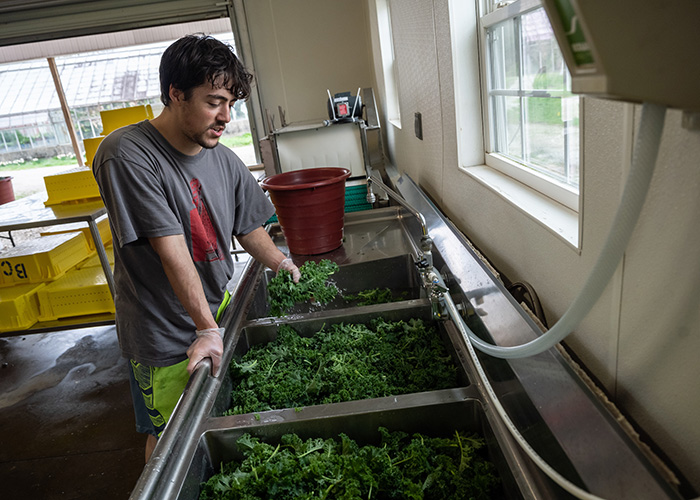The Berea College Horticulture Farm produces a variety of fruits, vegetables, greens, and root crops. Consumer demand determines what is grown on the Farm, with small fruits and greens being some of the most popular products. Many of the crops start from seed in the newest greenhouse. Seedlings move to the fields and high tunnels once they’re large enough. However, some crops, such as strawberries and sweet potatoes, are purchased from vendors, ready to plant. Students can participate in the full cycle from seed to market.
What we Grow
Some of the warm season crops produced on the Farm include tomatoes, eggplant, cucumber, squash, beans and peppers. Crops that are more vulnerable to pests and disease, such as tomatoes, grow in the high tunnels to provide a more controlled environment for pest and disease monitoring. The Horticulture Farm also produces blueberries, strawberries, and blackberries, harvested in the warm season.
Even in the cool season, production at the Farm continues. By utilizing the eight high tunnels and two heated greenhouses, production can continue year-round. By the time production of warm-season crops slows and comes to an end, cool-season crops have been seeded and planted. Kale, lettuce, collards and other greens are grown in succession throughout the fall to ensure that harvests can continue through the winter and spring.
Other crops grown at the Horticulture Farm include herbs, root crops and bulbs like garlic and onions. Herbs include rosemary, thyme, oregano, dill and basil. The Farm Store kitchen staff often use these herbs for baking and cooking, but customers may also purchase them. Root crops include sweet potatoes, beets, radishes and carrots.

Packaged with Care
To be sold to the Dining Hall and at the Farm Store, produce must first be washed, packaged, labeled and recorded. In 2013, the College built a packing house on the Farm to provide a space to prepare produce for sale safely. Following food safety guidelines, produce is harvested and brought into the packing house to be washed. For example, greens receive a triple wash in an organic-approved sanitizing solution before being spun dry and packaged. All produce is weighed, packaged and labeled before being stored in one of the walk-in coolers. Each step of production involves strict record-keeping procedures to meet Organic Certification requirements.
